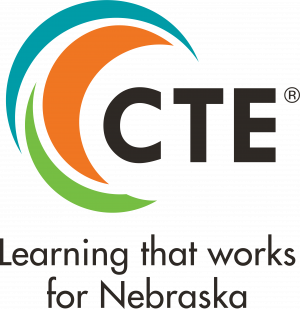State Model Programs of Study
Nebraska Career & Technical Education (CTE) delivers coordinated, relevant learning opportunities that engage each student in high-quality, rigorous education. These opportunities are enhanced by partnerships with business and industry, workforce, and economic development leaders, allowing learners to turn their passion, talents, and strengths into successful careers and fulfilling lives.
Aligning CTE Programs is a strategic priority of Nebraska CTE. State Model Program of Studies are developed to:
- Assist secondary schools in creating meaningful sequences of courses that adequately prepare individuals for seamless transitions to postsecondary education and careers eliminating duplication of coursework;
- Assist students in identifying appropriate courses for high school and postsecondary education that lead to their chosen career;
- Encourage collaboration between secondary and postsecondary education through curriculum alignment;
- Offer opportunities for high-quality workplace experiences aligned to students’ career interests;
- Promote the advancement of early postsecondary opportunities (including dual-credit courses) for all students; and
- Support postsecondary education options for students to further prepare them for successful transitions to their future careers.
Select a career field below to view the Programs of Study.
The Agriculture, Food, and Natural Resources Career Field area provides opportunities for students to deepen their understanding of topics such as animal science, plant and soil science, agribusiness, food products, and processing, power, structural, and technical systems, leadership, and personal development, biotechnology, and environmental and natural resources.
Click here to view the Agriculture, Food, and Natural Resources Program of Study.
Download the AFNR Programs of Study Excel file here.
Stacie Turnbull, Ph.D.
Agriculture, Food and Natural Resources Career Field Specialist
(402) 310-8344
stacie.turnbull@nebraska.gov
The Business, Marketing, and Management Career Field Area provides opportunities for students to deepen their understanding of topics in areas such as financial literacy, business technologies, communication, business, and consumer law, entrepreneurship, accounting, economics, personal finance, financial services marketing, retailing, fashion marketing/merchandising, international marketing, sports, and entertainment marketing, global business, and hospitality and tourism.
Click here to view the Business, Marketing, and Management Program of Study.
Download the BMM Programs of Study Excel file here.
Mary Janssen
Business, Marketing, and Management Career Field Specialist
(531) 510-7315
mary.janssen@nebraska.gov
Communication and Information Systems Career Field Area provides opportunities for students to deepen their understanding of topics in areas such as computer science, information technology, e-commerce, advertising, public relations, commercial photography, journalism, graphic design, broadcasting, scriptwriting, radio/TV production, business technology applications, web design, interactive media, and networking.
Click here to view the Communication and Information Systems Program of Study.
Download the CIS Programs of Study Excel file here.
Computer Science and Technology Content Standards.
Jacqui Garrison
Communication and Information Systems
Career Field Specialist
(531) 530-7648
jacqui.garrison@nebraska.gov
Shaun Young
Computer Science & Technology Education Specialist
(402) 326-7304
shaun.young@nebraska.gov
Health Sciences Career Field Area provides opportunities for students to deepen their understanding of topics in areas such as biotechnology research and development, behavioral health, diagnostic services, health informatics, supportive services, therapeutic services, and life span performance.
Click here to view the Health Sciences Program of Study.
Download the Health Science Excel file here.
Jamelyn Denny
Health Sciences Career Field Specialist
(531) 229-3156
jamelyn.denny@nebraska.gov
Human Sciences and Education Career Field Area provides opportunities for students to deepen their understanding of topics in areas such as family and consumer sciences, education and training, government and public administration, counseling and mental health, food and nutrition science, health and wellness, housing and interior design, human growth and development, early childhood education, personal relationships, textiles and apparel design, culinary arts, hospitality and tourism, family and community services, merchandising, and law, public safety, and security.
Click here to view the Human Sciences and Education Program of Study.
Download the HS&E Programs of Study Excel File here.
Miranda Bright
Human Sciences and Education Career Field Specialist
(402) 937-5095
miranda.bright@nebraska.gov
Chelsey Greene
Human Sciences and Education Career Field Specialist
(402) 937-5095
chelsey.greene@nebraska.gov
Skilled and Technical Sciences Field Area provides opportunities for students to deepen their understanding of topics in areas such as architectural and design drafting, construction, electricity/electronics, home maintenance, welding, manufacturing, engineering, energy, technical education, and transportation, distribution, and logistics.
Click here to view the Skilled and Technical Sciences Program of Study.
Download the STS Programs of Study Excel file here.
Aaron Jones
Skilled and Technical Sciences Career Field Specialist
(531) 739-8224
aaron.jones@nebraska.gov
Middle School Career Field Standards and Resources
Middle Level Career Field Area Standards and Resources
Agriculture, Food, and Natural Resources
Middle School Introduction to AFNR (011012)
Careers and Literacy of Agriculture (018002)
Business Marketing and Management
Exploration of Business and Entrepreneurship (032350)
Communication and Information Systems
Introduction to Business Technology (033422)
Introduction to Computer Science (270411)
Introduction to Web Design (270412)
Introduction to Web Design and Computer Science (270410)
Keyboarding Applications (033501)
Human Sciences and Education
Family and Consumer Sciences (FCS) 6 (090005)
Family and Consumer Sciences (FCS) 7 (090006)
Family and Consumer Sciences (FCS) 8 (090007)
Skilled and Technical Sciences
Exploring Skilled and Technical Science – 6th Grade (100706)
Exploring Skilled and Technical Science – 7th Grade (100707)
Exploring Skilled and Technical Science – 8th Grade (100708)
Middle School Career Development Resources
Program of Study Revision Process
In July of 2018, the Strengthening Career and Technical Education for the 21st Century Act (Perkins V) was signed into law, which reauthorized the Carl D. Perkins Career and Technical Education Act of 2006 (Perkins IV). Perkins V maintains a focus on Programs of Study as the primary delivery model for CTE. Programs of Study are coordinated, non-duplicative sequences of academic and technical content at the secondary and postsecondary levels that are aligned with the needs of industries in Nebraska’s economy, progress in specificity, have multiple entry and exit points that incorporate credentialing, and culminate in the attainment of a recognized postsecondary credential. Nebraska’s CTE Program of Study provides a framework for teaching and learning in a given career field area.
In January of 2021 and in response to the strategic priorities outlined in Nebraska’s Perkins V State Plan, business and industry leaders and postsecondary educators were engaged to inform and recommend any needed updates or revisions to the existing Programs of Study to ensure alignment with the needs of Nebraska’s evolving workforce. These recommendations were then taken under consideration as groups of educators met to identify and carry out needed revisions. The updated Programs of Study and course standards were released in December 2021.
Stakeholder Engagement Reports
Futuring Panel Trends Report
Futuring panels (focus groups) were invited and selected by each career field leader and investigated the skills and future needs within specific industries. These meetings were facilitated by MBA Research, a non-profit operated by a consortium of state education departments dedicated to supporting educators in the preparation of students for careers. During these meetings, business and industry representatives identified trends and issues within their industries, reviewed/validated career readiness skills, and identified implications for quality work-based learning.
Work-Based Learning Landscape Analysis
Partnering with the Nebraska Department of Education’s Office of Career and Technical Education, TNTP completed a Work-Based Learning Landscape Analysis, using quantitative and qualitative techniques to analyze the current Nebraska Career and Technical Education Standards Revision Process approach to work-based learning (WBL) in Nebraska—identifying strengths, barriers, and existing resources. In the resulting report, TNTP shared their analysis and highlighted concrete steps to give more students in our state access to high-quality WBL. Significant findings include the need to improve equitable access, expand student awareness, and provide ease of tracking participation.






